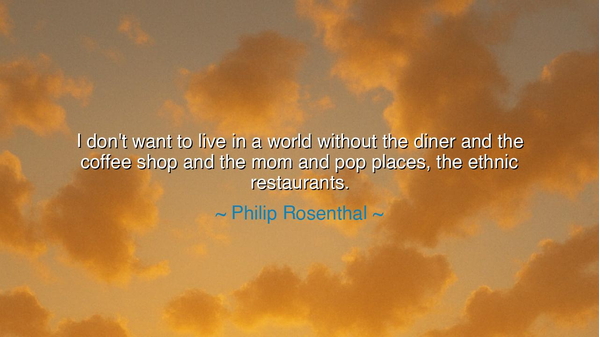
I don't want to live in a world without the diner and the coffee
I don't want to live in a world without the diner and the coffee shop and the mom and pop places, the ethnic restaurants.






The storyteller and traveler Philip Rosenthal, whose heart delights in the simple joys of food and fellowship, once said: “I don't want to live in a world without the diner and the coffee shop and the mom and pop places, the ethnic restaurants.” At first, these words may seem like a gentle nostalgia for comfort and cuisine—but beneath them lies a deeper truth about community, heritage, and the sacred art of human connection. For in these humble places—the diner at the corner, the family-run kitchen, the café filled with laughter—there beats the living heart of civilization itself.
The origin of this quote comes from Rosenthal’s lifelong journey as a creator and host, traveling across continents in search of not just food, but the stories behind it. He has seen the vast and glittering world of modernity, where chains and convenience often smother the soul of culture. And so he speaks, not as a critic of progress, but as a guardian of humanity’s warmth. For when he says he cannot live in a world without diners and mom-and-pop shops, he is defending the essence of what makes us human: connection through shared experience, the communion of hearts over simple meals, the preservation of identity in an ever-homogenizing world.
To understand this fully, one must remember that food is never merely sustenance—it is memory made edible. Every small restaurant, every family-run eatery, carries within it a lineage of love and labor. The diner is not just a building—it is a refuge for the weary, a chapel for conversation, a place where loneliness is broken by a smile and a cup of coffee. The ethnic restaurant is not just a business—it is a bridge between worlds, the meeting of ancestors and strangers alike. When we lose these places, we lose more than good food; we lose our stories, our diversity, our humanity.
History offers us many reminders of this truth. In ancient Greece, the agora, the public market, was the cradle of democracy—a space not only for trade but for dialogue and friendship. In the villages of old Japan, the tea house became a place where samurai and peasants alike could rest and reflect in silence and civility. In every age, civilization has been held together not only by laws and rulers, but by gathering places—those humble sanctuaries where the soul could rest and the spirit could be nourished. When such places vanish, societies grow cold, and the people, though surrounded by luxury, grow lonely.
Rosenthal’s words, then, are a lament and a call—a lament for what modernity threatens to erase, and a call to remember what truly matters. In an age of screens and speed, he asks us to slow down and see the sacred in the ordinary. To sit in a diner and speak with a stranger. To taste the stew of a family who carried their recipes across oceans. To remember that culture is not made by corporations, but by hands that cook, hearts that serve, and voices that welcome.
The lesson of this wisdom is clear: we must cherish the small, the local, the personal. Seek out the family-owned restaurant over the sterile chain. Honor the places where the food is imperfect but the spirit is perfect. In doing so, we keep alive not only our traditions, but our compassion. For every meal shared in such a place is an act of preservation—a quiet defiance against the tide of indifference.
To the listener, I say this: When you next pass the small diner with its faded sign or the café tucked between tall buildings, do not walk by. Step inside. Taste what generations have built. Speak to the owner, learn their story, and leave a part of your heart behind. For these are not just places—they are temples of belonging.
And so, as Philip Rosenthal reminds us, to live in a world without the diner, the mom-and-pop shop, and the ethnic restaurant would be to live in a world stripped of its soul. Let us then protect these sanctuaries of humanity, for they remind us that joy, kindness, and connection are not found in abundance, but in intimacy. They are the firelight of civilization—the simple, shining proof that we are still, despite all change, one great family at the world’s table.






AAdministratorAdministrator
Welcome, honored guests. Please leave a comment, we will respond soon